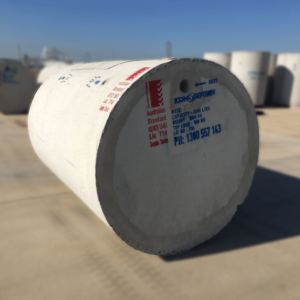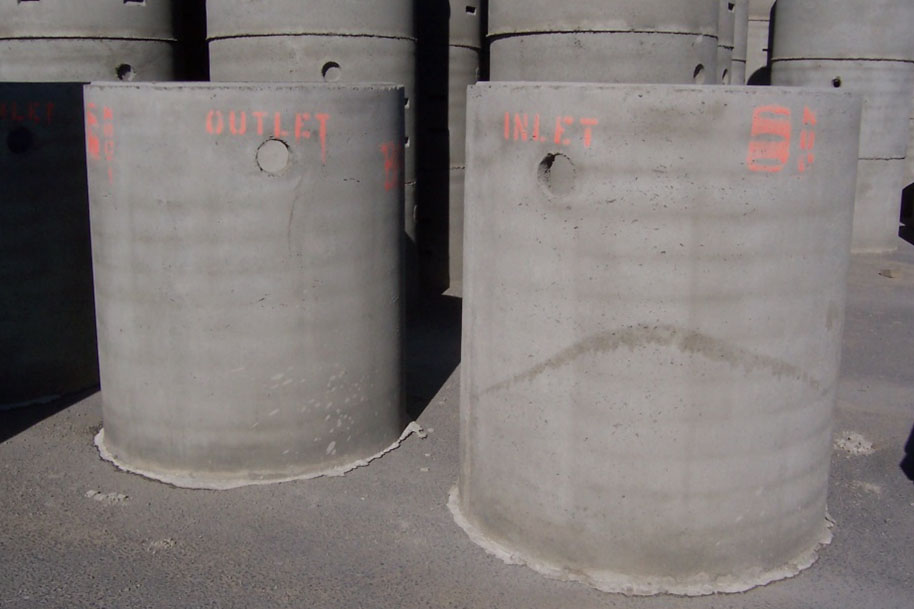A septic tank is a durable, underground container used for treating and managing wastewater at homes that are not connected to municipal sewage systems. Essential for homes in remote or rural areas, these tanks provide a private, efficient solution for wastewater treatment.
Why Should You Install a Septic Tank for Your Residential Property?
Residential septic tanks allow property owners to manage their wastewater sustainably and reduce the need for public utilities. Choosing a septic tank system means opting for a reliable, self-contained solution that ensures your property’s sanitation and environmental compliance.
What are Septic Tanks?
Septic tanks are key components of a private onsite wastewater treatment system. It is a popular residential plumbing solution for homes far away from municipal systems. Typically made from concrete, these tanks treat and dispose of household wastewater underground. A standard septic system comprises two main parts: the septic tank itself and a drain field.
The tank serves as a reception point for wastewater from the home, where it separates solid waste from liquids. Solids settle at the bottom – forming a sludge layer – while lighter substances like oils rise to the top, which then creates a scum layer. The middle layer of partially clarified water then flows out into the drain field, further treated by the soil’s natural filtering processes.
This setup is key to keeping our environment and communities safe. By cleaning the wastewater right where it’s used, septic tanks stop harmful waste from getting into our drinking water. This is crucial for avoiding serious risks from contaminated/unhealthy water sources. Also, using septic systems is sustainable because it leads to less pollution and saves water. They recycle cleaned water back to nature, helping plants and animals thrive.
It should be noted that Septic Tanks is are subject to strict regulatory requirements. Further details can be found within this article. It must also be recognised that a Septic Tank is just one form of Wastewater management. Their may be a jurisdiction requirement or a purchaser preference to seek an alternative system such as an Aerated Wastewater Treatment System (AWTS) or Leach Drains to service your residential property’s wastewater needs

Advantages of Septic Tanks for Your Property
Residential septic tanks offer several benefits that make them a smart choice for homeowners, such as:
- Durability and Longevity: Concrete septic tanks are known for their robustness. They’re designed to endure for many years, minimizing the need for replacements. This durability ensures that once installed, your septic system will serve your property efficiently over the long term.
- Weather Resistance: These tanks are built to withstand extreme weather conditions for all around Australia. Whether it’s heavy rain or floods, concrete septic tanks maintain their integrity. This resilience is crucial for preventing system failures during adverse weather, providing homeowners with peace of mind.
- Cost-Effectiveness: While the upfront cost might be higher compared to other systems, septic tanks offer significant long-term savings. Their durability and low maintenance requirements mean fewer repairs and less frequent replacements, making them a cost-effective solution for wastewater management.
- Ease of Maintenance: Maintaining a septic tank is relatively straightforward. Regular inspections and pumping every 3-5 years are the main requirements. This simple routine can prevent most issues, ensuring the system operates smoothly and efficiently.
Types of Residential Septic Tanks
Homeowners often compare concrete and plastic tanks before buying. Here are two residential septic tank designs to learn about.
Concrete & Precast Concrete
Concrete septic tanks are favoured for their strength and versatility, suitable for various soil conditions. Precast concrete options go a step further by offering uniform quality and reliability, as they are manufactured in a controlled environment before installation.
This ensures consistency in the residential concrete septic tanks’ structure and performance. Choosing precast concrete not only guarantees a robust wastewater management system but also provides assurance of quality and longevity, making it an excellent investment for homeowners.
Plastic
Residential plastic septic tanks are recognized for their lightweight construction and resistance to corrosion, making them a practical choice in certain scenarios. Their design allows for easier handling and installation, especially in locations difficult to access or where soil conditions are less favourable for heavy concrete tanks.
These tanks are particularly advantageous in areas prone to high moisture or corrosive materials, where their non-corrosive properties can significantly extend the lifespan of the septic system. For homeowners looking for a cost-effective and durable solution, plastic septic tanks offer a compelling alternative.
Residential Septic Tank Sizes
Choosing the right size for a residential septic tank is crucial and depends mainly on the size of the household and the amount of wastewater it produces. The tank must be large enough to handle the daily water usage of all residents, ensuring efficient treatment and minimizing the risk of overloading the system.
Standard septic tank sizes typically range from smaller units that accommodate low-use properties to larger tanks designed for more substantial households. For example, a smaller family might only need a tank of around 1000 litres, while a larger home or a property with higher water usage could require a tank of 5000 litres or more.
For properties with unique requirements—such as those with limited space, unusual soil conditions, or particularly high water usage—custom-sized septic tanks are available. These are designed to fit specific needs, ensuring that every property, no matter how distinctive, can have an efficient and effective wastewater treatment solution. Custom tanks allow homeowners to tailor the septic system to their exact needs, providing peace of mind that their system is as efficient and reliable as possible.
Maintenance & Cleaning
Maintaining a septic tank is essential for ensuring the system’s efficiency and longevity. Regular inspections by professionals every three years can catch potential problems early, preventing costly repairs. Pumping the septic tank every three to five years is crucial to remove the build-up of solids that could lead to system failures. The frequency of pumping varies based on the tank’s size and the household’s water usage, making it an important factor to consider for proper maintenance.
Daily practices also contribute significantly to a septic tank’s health. Homeowners should avoid flushing non-biodegradable items and reduce the use of harsh chemicals that can disrupt the tank’s microbial balance. These simple yet effective measures help prevent blockages and maintain the system’s proper functioning. This ensures that the residential septic tank is clean and processes household wastewater efficiently.
Concrete septic tanks, with proper care, can last for over 30 years, making them a durable choice for residential wastewater treatment. Their longevity is attributed to the material’s robustness and the effectiveness of regular maintenance routines. This combination of professional care and homeowner vigilance ensures that concrete septic tanks remain a reliable and sustainable solution for managing residential wastewater.
Regulatory Requirements for Residential Septic Tanks
Residential septic tanks across Australia are subject to strict regulatory requirements aimed at ensuring homeowner safety and environmental protection. These regulations, typically enforced at the state or territory level, mandate compliance with specific health and safety standards to mitigate risks associated with sewage management facilities, including septic tanks. Accreditation by relevant government authorities is often a prerequisite for the installation of septic systems.
Following these regulations is crucial to prevent potential hazards to public health and the environment. By meeting accreditation standards, homeowners can trust that their septic systems are designed and installed to operate efficiently and safely. Compliance also helps mitigate the risk of groundwater contamination and protects local ecosystems from pollutants that may result from improper sewage management practices.
Please check your state’s regulations for the most current information, such as the accreditation of sewage management facilities in NSW.
Why Choose CivilMart for Your Residential Septic Tank?
When it comes to your septic tank needs, choose CivilMart for high-quality finishes from leading brands. With a wide range of high-quality septic tank options, CivilMart is the go-to destination for homeowners. With over 100 years of experience serving Australians, we understand the importance of durability and reliability.
Our national manufacturing network ensures timely delivery no matter your project location. Get in touch with our team today for reliable septic tank solutions you can trust.
Join the Civilmart family
Stay up to date with latest product releases, newest industry innovations and more!


